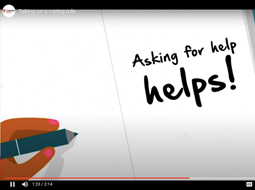In this section, you can find useful links to government guidance and tips for carers.
Having symptoms
It's important to know what support is available to you as a carer and those you look after to help manage the risks posed by COVID-19.
If you have a symptom of the coronavirus, the recommendation is to stay at home and well away from others. Symptoms are now broader than those originally typically reported of a continuous cough, fever and lack of taste or smell. Cold and flu like symptoms, for example, may be indicators – see this list for more information.
PCR and lateral flow tests are no longer free of charge to the general public across much of the UK, but will remain available free for at risk groups. If the test result is positive, you should advise those you have been close to in recent days straight away, arrange care cover if necessary and self-isolate.
Do seek medical help if the symptoms become severe and difficult to manage. Further guidance can also be found on the NHS 111 page.
Getting help in Scotland, Wales or Northern Ireland
- Scotland: Check your symptoms online.
- Wales: Check your symptoms online.
- Northern Ireland: Check your symptoms online
Seeking guidance?
Understandably, you may still be concerned about those who are most vulnerable to the COVID-19. It may be helpful to check the current NHS and government guidance.
In England, there are recommendations you can follow here.
In Scotland, see this guidance.
In Northern Ireland, you can find out about the current restrictions and rules to follow here.
In Wales, you can find more details about the latest guidance here.
To prepare for a situation where you are unable to care for someone for a period of time, you may find peace of mind in putting together a contingency plan which can be shared with family or friends. You may find it helpful to use our tool to help guide you in creating one.
What support is available to help if you have COVID-19?
On the NHS website, there is helpful guidance outlining what to do if you have COVID-19 and how to cope with different symptoms. See the guidance here. If you live in Scotland, you can check the NHS Inform's website.
If you are struggling to cope with the symptoms or for other reasons, do not hesitate to seek further advice by visiting 111 online or call 111. If you are experiencing any alarming or life-threatening symptoms such as extreme breathlessness or a seizure, call 999.
Some helpful reminders
Here is some guidance on what is useful to bear in mind when you have caring responsibilities.
Reminders of what to consider
If you are caring for someone who is extremely vulnerable, it is useful to understand what extra care and precautionary measures you can take.
You can take a range of careful measures such as wearing a face covering, keeping the environment well ventilated, frequently washing your hands and cleaning all shared surfaces, whilst minimising any contact where possible.
- Find out about the latest guidance in your area: England, Wales, Scotland or Northern Ireland.
- If you do start having symptoms, there are steps you can take to get tested immediately and arrange alternative care cover – see below.
- Need to consider a contingency plan? For suggestions on arranging alternative care, see our guidance on making a plan.
- If you become ill and no one can fill in for you, contact your council or trust straight away and explain the situation.
- You can also find advice about protecting those who are most vulnerable to the virus here.
Getting vaccinated and boosted
It is strongly recommended that you receive your routine vaccines and boosters for COVID-19 if you can. You can notify your GP or arrange one online. You may need to register with a GP practice if you haven't already.
Are there long-term effects from coronavirus (long COVID)?
After having COVID-19, some people find that they have lingering effects from the virus. It is important to seek help if you (or someone you care for) are being affected. The NHS provides useful guidance to help you recognise the signs and aid recovery.
They have a dedicated website to provide support if you're caring for someone with long-term effects.
The charity Covid Aid also offer support, guidance and advice for anyone dealing with long-lasting problems caused by COVID-19.
Staying safe – tips to help protect someone who is vulnerable
We have brought together some key tips to help lessen the risk for you and loved ones posed by COVID-19.
You may care for a friend or relative who is still at risk of becoming seriously ill from COVID-19. There have been life-saving vaccines and huge progress in medical treatments and hospital care, but you may worry about those you look after, especially if they are clinically vulnerable or unable to have the vaccines.
Below, you can find recommendations on how to stay safe and make others aware of your situation, as we take a look at some day-to-day scenarios as examples.
1 Tips on face coverings
2 Ensuring you have care cover
3 Getting around
4 Socialising with others and safety indoors
5 A recommendations checklist
1/ Tips on face coverings
Can we still wear masks? Which ones should we buy and how often should we change them? What can I do if the person I look after can’t wear a mask?
In some health and social care settings, such as hospitals, it is still obligatory to wear a mask. Although it is no longer a legal requirement in crowded public areas, you still have the option to wear one if you feel more comfortable doing so. Masks have been used primarily to protect others, but can also be used to protect yourself.
In terms of face coverings that offer most protection, the World Health Organisation (WHO) would recommend:
- three layers of fabric and having multiple layers made from different fabrics
- not to use masks with valves
- ensure it covers your nose, mouth and chin
- washing fabric masks every day or disposing medical ones.
Which? has more detailed information on their website.
Understandably, not everyone is able to wear a mask. There are still exemption cards and letters available like this example from Breakthrough. However, if you are going to a hospital for a visit or appointment, we would recommend checking with the hospital in advance to see what their policy is as there may be certain rules and precautions to follow if you’re not able to wear a mask.
2/ Ensuring you have care cover
What will happen if I come down with COVID-19 or a similar illness and can’t continue caring for a while?
One of the best ways to prepare for difficult circumstances when you can’t provide care is to develop a contingency plan. It could give you peace of mind to know that there will be trusted people to step in and help provide cover if ever needed. You could try using our online contingency planning tool as a starting point which provides a helpful report and checklist. Also see our emergency planning page for tips. When possible, provide copies of this to close friends or relatives.
Another good idea is to register your role as a carer with your GP. You can find information and a template letter to help alert them to the essential support you provide for someone on our talk to your GP page. Some GP practices have web forms on their websites for carers to register online more easily.
3/ Getting around
I often need to use taxis, but the drivers don’t always wear masks – I’m now anxious about using public transport.
Using public transport can be a daunting prospect if you worry about being within close proximity to others. On buses, trains and tubes, try to avoid travelling during busy periods when you could hit rush hour. Try to get on carriages towards the end of the platform, that are likely to be less busy, and aim to be positioned near a window which could be opened for better ventilation.
If you regularly use a taxi service, perhaps suggest that you would prefer the driver to wear a mask and keep the windows down as a comment in the app you use in advance when ordering the taxi, or mention this when you call up. If asked politely to support you with these considerations, the driver is likely to be obliging.
4/ Socialising with others and safety indoors
I’m not sure whether to go out socially anymore as no one is taking any precautions and restaurants are so busy.
If you feel anxious about going to crowded settings, it can be difficult socially. Try to talk to friends and be open about how you feel. You could suggest meeting up outdoors, where possible, or ensuring that indoor spaces are well-ventilated and that social distancing can be observed. If you’re planning to go to a restaurant, you could call ahead and ask if it would be possible for your waiter or waitress to wear a mask when serving you, explaining your situation.
5/ A recommendations checklist to help protect someone who is very vulnerable
Recommendations checklist
- Keep informed about recent vaccination and booster updates or medication advances. We would recommend keeping up to date with NHS guidance and government guidelines so that you can make sure you're receiving all the help you're entitled to.
- Try to keep your distance from those who have tested positive from COVID-19 or who have symptoms for 10 days.
- Consider continuing to wear a well-designed face covering in crowded areas or whilst shopping.
- Keep your home well ventilated.
- In advance, you could ask visitors to wear masks, take lateral flow tests or keep at a safe distance.
- Avoid crowded situations and busy indoor locations where possible.
- Ask others to take a lateral flow test before meeting them.
- Keep social distancing if you feel more comfortable doing so.
- The NHS is offering new treatments to people with COVID-19 who are at highest risk of becoming seriously ill. You could enquire about these and ask the GP of the person you care for if they have any information about their suitability.
- Note that people eligible for COVID-19 treatments will still be able to access lateral flow tests from the government.
- If you are attending an event, contact the organisers ahead if you need any special allowances made.
- Practical aids can be printed off to alert people if you require them to be aware of your situation. Here are some examples.
- Focus on the positive things you can do to stay happy, stress-free and healthy. See our Keeping active and well page for some ideas. Also consider joining an online community like our Carers Active Hub or joining us for an online meet up such as an online chat or Share and Learn session.


